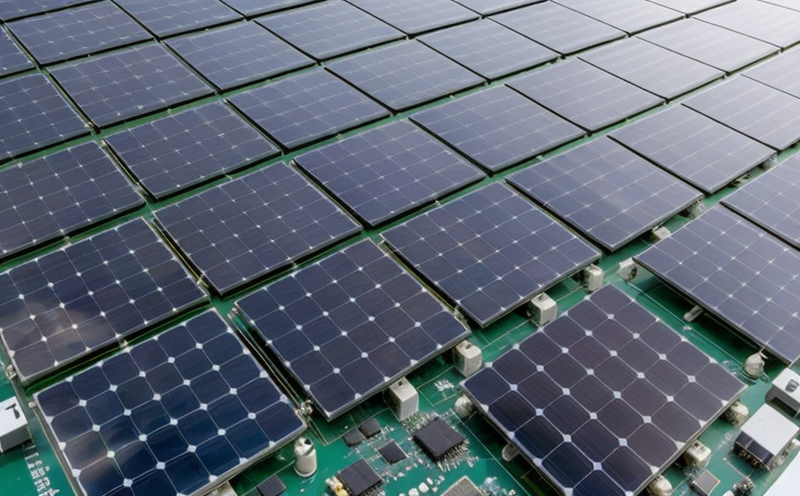CSA C1741 PV Inverter Certification Testing
The CSA C1741 standard is a rigorous framework for the certification of photovoltaic (PV) inverters. This testing ensures that products comply with safety and performance requirements, which are critical to protecting end-users from potential hazards while ensuring efficient operation.
The PV inverter plays a pivotal role in converting direct current (DC) produced by solar panels into alternating current (AC) suitable for household or grid use. Given the increasing reliance on renewable energy sources, particularly in residential and commercial settings, the importance of robust certification cannot be overstated. The CSA C1741 certification guarantees that PV inverters meet stringent requirements set forth by industry standards.
The testing process involves a comprehensive series of evaluations aimed at verifying compliance with all relevant sections of the standard. This includes electrical safety assessments, efficiency tests under various operating conditions, and environmental stress tests to ensure durability in real-world scenarios. Compliance with these tests not only enhances product reliability but also provides assurance to consumers that they are investing in safe, efficient equipment.
For quality managers and compliance officers, understanding the nuances of CSA C1741 is essential for ensuring that products meet regulatory requirements. R&D engineers can benefit from this testing by identifying potential improvements or areas for optimization. In procurement processes, selecting suppliers who undergo such rigorous certification ensures long-term reliability and safety.
Efficiency in PV inverters is a primary focus of the CSA C1741 standard. The efficiency tests simulate various operating conditions to determine how well the inverter converts DC into AC with minimal loss. This efficiency testing can vary widely depending on factors like input voltage, temperature, and load conditions.
Environmental stress tests are another critical component of this certification. These tests evaluate the ability of PV inverters to withstand extreme environmental conditions such as high temperatures, humidity, and cold snaps. The goal is to ensure that these devices remain functional under real-world conditions, which can vary significantly depending on geographical location.
The safety aspects are equally important in the context of renewable energy electronics testing. Electrical safety tests cover a broad range of scenarios designed to identify potential hazards before they become operational issues. These include ground fault protection, overcurrent protection, and insulation resistance checks, among others.
Compliance with CSA C1741 is not just about meeting regulatory requirements; it sets the benchmark for excellence in PV inverter design and manufacturing. By adhering to this standard, manufacturers demonstrate their commitment to producing safe, efficient, and reliable products.
Benefits
The benefits of obtaining CSA C1741 certification for PV inverters are multifaceted and extend beyond mere compliance with regulations. Certification provides a robust framework for ensuring product reliability, safety, and efficiency, which are crucial in the rapidly growing renewable energy sector.
- Enhanced Safety: By adhering to the stringent requirements of CSA C1741, manufacturers ensure that their products do not pose any risks to end-users. This is particularly important given the high voltage and complex electrical systems involved in PV inverters.
- Improved Efficiency: The efficiency tests underpinning this certification help identify areas for optimization, leading to more efficient operation of PV inverters. This can result in significant cost savings for users who benefit from lower energy consumption.
- Better Brand Reputation: Achieving such a high-standard certification enhances the reputation and credibility of manufacturers in the industry. It signals to customers that they are choosing products backed by rigorous testing and adherence to international standards.
- Facilitated Market Access: Many jurisdictions mandate compliance with specific safety and performance standards for PV inverters. CSA C1741 certification facilitates easier market entry into these regions, reducing the time and cost associated with regulatory compliance.
- Increased Consumer Confidence: Consumers are increasingly aware of the importance of renewable energy solutions in combating climate change. A certified product instills confidence, making it a preferred choice for environmentally conscious consumers.
- Simplified Compliance: The certification process itself can simplify the compliance journey by providing clear guidelines and standards to follow, thereby reducing administrative burdens on manufacturers.
Overall, CSA C1741 certification serves as a comprehensive quality assurance mechanism that benefits all stakeholders in the renewable energy sector, from manufacturers to end-users.
Why Choose This Test
- Regulatory Compliance: The standard ensures compliance with international regulations and helps manufacturers navigate complex regulatory landscapes.
- Rigorous Testing: A series of comprehensive tests guarantees that products meet the highest safety and performance standards.
- Industry Recognition: Certification by CSA is recognized globally, enhancing brand reputation and market credibility.
- Consumer Trust: Certified products instill trust in consumers, who can be confident about the quality and reliability of their purchases.
- Ease of Compliance: The standard provides clear guidelines that simplify the process of ensuring compliance with international regulations.
- Competitive Advantage: By adhering to such a stringent standard, manufacturers gain a competitive edge in a crowded market by offering superior quality products.
The CSA C1741 PV Inverter Certification Testing is an indispensable service for those involved in the renewable energy sector. It not only ensures compliance with international standards but also sets a benchmark for excellence in product design and manufacturing.





